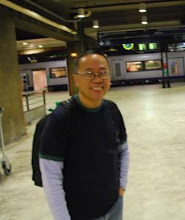 ROGELIO DE LA ROSA FOR PRESIDENT MOVEMENT. This national movement quickly gained momentum in the provinces and supporters were issued IDs such as this. It came with this pledge: "I do solemnly pledge my full support for Rogelio de la Rosa in his bid for the Presidency of the Philippines and, in furtherance thereof, I shall actively and extensively campaign, to the best of my ability, in order to bring about the fulfillment of the people's hope and desire that he be elected this coming election...as he is the new hope of our Republic".
ROGELIO DE LA ROSA FOR PRESIDENT MOVEMENT. This national movement quickly gained momentum in the provinces and supporters were issued IDs such as this. It came with this pledge: "I do solemnly pledge my full support for Rogelio de la Rosa in his bid for the Presidency of the Philippines and, in furtherance thereof, I shall actively and extensively campaign, to the best of my ability, in order to bring about the fulfillment of the people's hope and desire that he be elected this coming election...as he is the new hope of our Republic".Rogelio de la Rosa, the top matinee idol of the 1950s, could have been the country’s first actor-president, pre-dating the achievement of actor Ronald Reagan, who became America’s top leader, by 20 years. This Lubao-born personality could be said to have prepared all his life for his biggest leading role ever—that of becoming the country’s head of state in 1961!
After all, Rogelio was an early student of the proverbial school of hard knocks. To support his family, he took to the zarzuela and became a star, although he always played villain to Diosdado Macapagal, his brother-in-law, (he was married to his younger sister, Purita) who kept landing heroic roles At one point, he worked as a checker, a time-keeper and a fruit seller in Divisoria, and at age 16, he became a boxer and a Golden Gloves Champion. He excelled in public speaking and debating, and captained his high school team in various competitions in Central Luzon and Manila.
During the War, he held the rank of a Major of the guerilla forces under Edwin P. Ramsay. He later became a chairman of the Committee on Recreations at the Veteran Memorial Hospital. Pres. Ramon Magsaysay named him his adviser on the Philippine movie industry.
In 1957, under the Liberal Party ticket headed by Jose Laurel and Diosdado Macapagal, Rogelio ran and won a Senatorial slot, the first movie personality to occupy an esteemed government position. As a Senator, he advocated the nationalization of local industries such as fishing and agriculture, particularly in his province, Pampanga. He also co-authored a bill that would lead to the creation of the Board of Censors.
This matinee idol had such a compelling presence and magnetic appeal that in the next presidential elections, a ‘Rogelio de la Rosa For President Movement’ was initiated by thousands of supporters. Touted as the “NEW HOPE of our Republic”, de la Rosa responded to the challenge and expressed his bid for the presidency to the delight of his fans and followers.
He could have easily won the 1961 presidential race but he withdrew from the election shortly before the election day, but the real reasons have not always been clear. One version from his Senate biography stated that Rogelio felt that the only way to ensure his rival's defeat was to withdraw, so that his drastic action would call attention to the political corruption of Pres. Garcia. A more popular reason was that his former brother-in-law, Diosdado P. Macapagal, was also in the race for presidency. It was said that Macapagal convinced him to discontinue his bid, so that votes will not be split between them. He gallantly withdrew, and the rest, as they say is history. Macapagal became the country’s 9th president by thwarting the re-election try of Carlos P. Garcia.
Rogelio ran again for the Senate in 1963 but was defeated, and would not be elected to public office again. Instead, he became a respected diplomat, becoming the Philippine Ambassador to Cambodia in 1965, and later, to the Netherlands, Poland, Bulgaria and Czechoslovakia. In his foreign assignments, he made sure to promote Philippine arts and culture until his retirement from the diplomatic corps in the 1980s.
Today, it has become very common for movie stars to use their career as a springboard to politics. Before Eddie Ilarde, Ramon Revilla Sr., Bong Revilla, Jinggoy Lapid (elected senators) and Joseph Estrada (elected President), there was the dashing Rogelio de la Rosa of Lubao, a Kapampangan, who paved the road for them, in their quest for stardom in the government.
(*NOTE: Feature titles with asterisks represent other writings of the author that appeared in other publications and are not included in the original book, "Views from the Pampang & Other Scenes")








2 comments:
I think Macapagal was the running mate of Jose Yulo when he won the vice presidency over Jose B. Laurel, Jr. who was the running mate of Carlos Garcia who won the presidency that time. TQ
That is correct. The other presidential candidate was Claro M.Recto.
Post a Comment